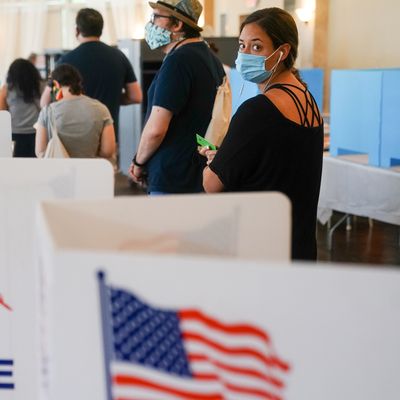
For all elements of the center-left coalition that helped lift Joe Biden to the presidency and Democrats to control of Congress, the struggle to reform or at least curtail the Senate filibuster is a common ambition and the essential precondition for nearly every legislative accomplishment. As New York’s Eric Levitz put it, it is “the defining battle of Biden’s presidency.”
But there is one legislative agenda item likely to be blocked by the filibuster that is especially urgent in the wake of the contested 2020 elections: protecting and extending voting rights in federal elections. To put it bluntly, the lesson many Republicans took away from their former president’s attempted theft of the presidential election is that the voters who defeated him need to be discouraged from returning to the polls in the future. As Ron Brownstein notes, there’s a new frenzy of voter-suppression measures underway in Republican-controlled states that may hold the balance of power in upcoming elections:
[L]egislators in an array of competitive states are employing Trump’s discredited claims of voter fraud to justify a new round of voting restrictions. In Georgia, Texas, Pennsylvania, Michigan, and Wisconsin, for example, Republican officials want to roll back on-demand voting by mail, eliminate ballot drop boxes, and/or impose tighter voter-identification laws. One hundred and six bills to restrict voting access have been introduced this year in 28 states, the Brennan Center for Justice, which advocates for voting rights, reported this week.
For federal elections, Congress has the power to preempt these state measures and set national standards supporting, not inhibiting, the right to vote. Indeed, restoring the safeguards the U.S. Supreme Court stripped from the Voting Rights Act of 1965 could go a long way to prevent or at least slow down a rush to widespread voter disenfranchisement. That is the object of the John Lewis Voting Rights Act, which, in the last Congress, was passed by the House with every Democrat supporting it, and with every Democratic senator co-sponsoring it (the Republican-controlled Senate, of course, never took it up). But the much broader protections of the For the People Act (also passed by the House and bottled up in the Senate) would sweep away state restrictions and, for the first time, truly make voting a right for all qualified citizens, as Brownstein explains:
For federal elections, it would require every state to do the following: provide online, automatic, and same-day registration; ensure at least 15 days of in-person early voting; provide all voters access to no-excuse, postage-free absentee ballots; and offer drop boxes where they can return those ballots. It would also end gerrymandering by requiring every state to create independent commissions to draw congressional districts; establish a system of public financing for congressional elections; institute new safeguards against foreign interference in elections; and require increased disclosure of the unlimited dark-money campaign spending that was unleashed by the Supreme Court’s 2010 Citizens United ruling, which like Shelby County was backed by the Court’s conservative majority.
The urgency of these measures should be obvious, with red states narrowing the path to the ballot box and with the decennial redistricting about to begin. And unlike many other measures facing a filibuster, voting rights and democracy-promotion legislation does not qualify for inclusion in a budget-reconciliation bill that can be enacted with a simple majority. So in many important respects, it’s now or never for voting rights.
The good news is that the fundamental — and for Democrats, existential — nature of voting-rights assurances could convince moderates who are otherwise reluctant to get rid of the filibuster to accept its elimination for this specific kind of legislation, leaving the tactic still available for bills addressing other issues. And it’s even possible (if unlikely) that Mitch McConnell would be reluctant to deploy the filibuster to kill the John Lewis Voting Rights Act (as distinguished from the broader pro-democracy provisions of the For the People Act), given the filibuster’s historic association with Jim Crow. And if there’s any sort of bipartisan, centrist-facilitated compromise on rules surrounding the filibuster, voting-rights bills would be an appropriate beneficiary.
In any event, Democrats in Congress and the White House and their advocacy-group and grassroots supporters need to come to a quick consensus about how to test the willingness of Democratic filibuster defenders like Joe Manchin and Kyrsten Sinema, and relatively independent Republicans like Susan Collins and Lisa Murkowski, to make some new exceptions to the disreputable old institution. Voting rights might offer the most compelling case for limited filibuster reform, and for Democrats, the cause without which all others may ultimately fail.






























